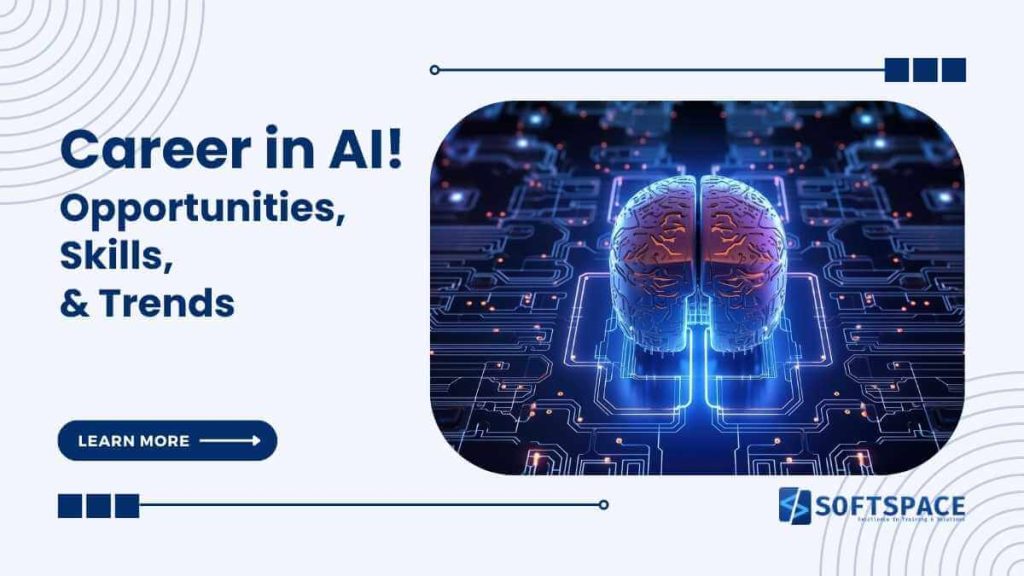Artificial Intelligence (AI) is a rapidly growing field of technology that involves the development of intelligent machines that can perform tasks that typically require human intelligence. Today AI has the potential to transform numerous industries and revolutionize the way we live and work.
Since a career in AI is in high demand it opens up a portal for a wide range of opportunities. According to a recent report by AmbitionBox, job postings related to AI have increased by 119% since 2015. The salary for Artificial Intelligence Engineers in India varies from ₹2.4 Lakhs to ₹35.0 Lakhs, with an average yearly salary of ₹8.0 Lakhs. Some of the top job titles in AI include Machine Learning Engineer, Data Scientist, AI Research Scientist, and Robotics Engineer.
In addition to high demand and salary potential, a career in AI also offers the opportunity to work on cutting-edge technologies and innovative projects that have the potential to make a significant impact on society. In this technologically advanced era, AI is being used in a variety of industries, including healthcare, finance, education, and transportation, among others.
According to a report by McKinsey, AI could contribute up to $13 trillion to the global economy by 2030. This highlights the immense potential for growth and innovation in the field of AI, and the opportunities it presents for those interested in pursuing a career in this field.
Without further ado, let’s dive right into the core of this blog and explore the thrilling career prospects that await you in the ever-growing field of Artificial Intelligence (AI).
Table of Contents
Exploring the AI Talent Maze: Career Paths in Artificial Intelligence

Artificial Intelligence (AI) has emerged as a game-changer in various fields, and its impact can be seen across industries ranging from healthcare to finance. As AI technology continues to advance, it is creating new career paths and opportunities for individuals looking to build a career in this field.
Here are some of the most popular types of career paths in Artificial Intelligence:
Machine Learning Engineer
A career in Machine Learning Engineering is highly sought after, and it is one of the most promising job titles in the field of Artificial Intelligence. According to a report by Indeed, job postings for Machine Learning Engineers have increased by 344% since 2015. The average annual salary for Machine Learning Engineers in India falls between ₹3.0 Lakhs and ₹21.0 Lakhs, with a mean salary of ₹6.2 Lakhs.
Machine Learning Engineers are responsible for designing, building, and deploying Machine Learning models that enable computer systems to make predictions and decisions based on data. They work closely with data scientists and software developers to build and deploy machine learning models.
With the increasing demand for Machine Learning applications in various industries such as healthcare, finance, and transportation, the demand for Machine Learning Engineers is expected to continue to rise in the coming years. As technology advances, the role of a Machine Learning Engineer is becoming more critical to ensure that the systems function efficiently and effectively.
Data Scientist
Data scientists are responsible for collecting, analyzing, and interpreting large amounts of data. They use statistical and machine learning techniques to extract insights and make predictions that can help businesses make better decisions.
A career in data science is one of the most in-demand and lucrative career options in today’s job market.
The average annual salary of a data science engineer in India ranges between ₹2.7 Lakhs to ₹25.0 Lakhs, with an average salary of ₹7.6 Lakhs. However, it’s important to note that salaries can vary based on factors such as experience, location, and the company. Here are some additional salary figures for data science engineers in India:
- According to KnowledgeHut, the average annual salary of a data engineer in India is about ₹8,71,312, with an entry-level salary of about ₹4,47,890.
- Glassdoor reports that the national average salary for a data science engineer in the United States is $103,261 per year.
- InterviewBit mentions that data scientists in India earn an average of Rs. 11,61,000 per year.
- Indeed states that the average salary for a data scientist in India is ₹9,98,370 per year.
With the massive amount of data being generated every day, companies in various industries are increasingly relying on data scientists to analyze, interpret and make sense of the data. As a data scientist, one can work in a wide range of fields such as finance, healthcare, marketing, and technology, among others. With the high demand for data scientists and the attractive salary packages, a career in data science is definitely worth considering for those interested in working with data and deriving insights from it.
AI Research Scientist
AI research scientists work on developing new AI algorithms and techniques. They use their expertise in mathematics, computer science, and statistics to create new models that can solve complex problems.
AI Research Scientists in India earn an average annual salary ranging from ₹3.0 Lakhs to ₹35.0 Lakhs, with an average of ₹9.0 Lakhs. However, Glassdoor reports the national average for an AI Research Scientist in India as ₹31,22,071 per year. Additional salary data for AI Research Scientists in India is as follows:
- 6figr.com indicates that AI Scientists earn an average of ₹29 lakhs annually, with a range typically spanning from ₹17 lakhs to ₹53 lakhs, based on 8 profiles.
- According to PayScale, the average salary for a Data Scientist with AI skills in India is ₹11,48,746 in 2023.
- Talent.com states that the average salary for a research scientist in India is ₹8,40,000 per year or ₹337 per hour.
- Entry-level positions start at ₹5,00,000 per year.
The demand for AI research scientists is expected to continue growing rapidly due to the increasing need for AI technologies in various industries, including healthcare, finance, and transportation, among others. Pursuing a career as an AI research scientist can lead to many exciting opportunities to contribute to groundbreaking research and innovations that have the potential to change the world.
Robotics Engineer
Robotics engineers are responsible for designing, building, and programming robots that can perform tasks that would normally require human intelligence. They work on developing robots for use in industries such as manufacturing, healthcare, and defence.
Robotics Engineers in India receive an average annual salary ranging from ₹1.8 Lakhs to ₹8.0 Lakhs, with an average of ₹3.5 Lakhs. However, these figures can vary depending on factors like experience, location, and company. Here are additional salary details for Robotics Engineers in India:
- According to PayScale, the average annual salary for a Robotics Engineer in India is ₹4,54,945.
- Talent.com states that the average salary for a Robotics Engineer in India is ₹10,00,000 per year or ₹401 per hour.
- Entry-level positions typically start at ₹5,00,000 per year.
- As per SalaryExpert, the average annual salary for a Robotics Engineer in India is ₹16,59,160, with an equivalent hourly rate of ₹798.
- Indeed reports that the average monthly salary for a Robotics Engineer in India is ₹23,015.
- AmbitionBox offers a breakdown of Robotics Engineer salaries based on seniority:
- Entry level (0-3 years): ₹1,70,000 per year
- Mid-senior level (5 years): ₹3,40,000 per year
- Senior-level (8 years): ₹7,50,000 per year.
The field of robotics engineering offers a wide range of opportunities, including developing autonomous vehicles, designing robots for manufacturing processes, and creating robotic prosthetics for medical use. As automation and robotics continue to play an increasingly important role in various industries, the demand for skilled robotics engineers is expected to continue to grow.
Natural Language Processing (NLP) Scientist
NLP scientists work on developing algorithms that can analyze and understand human language. They work on developing chatbots, voice assistants, and other applications that can interact with humans using natural language.
A career as a Natural Language Processing (NLP) Scientist is a promising field for those interested in the intersection of computer science and linguistics. NLP is a subfield of AI that focuses on enabling computers to understand, interpret, and generate human language. With the increasing adoption of virtual assistants, chatbots, and other AI-powered language technologies, the demand for NLP Scientists is on the rise.
The average annual salary for NLP Engineers in India spans from ₹3.0 Lakhs to ₹20.0 Lakhs, with an average of ₹8.0 Lakhs. However, these salaries can fluctuate based on variables like experience, location, and company. Here are additional salary insights for NLP Engineers in India:
- According to upGrad, NLP professionals in India have the potential for an annual salary reaching as high as ₹30 lakh.
- The Correlation reports that NLP Engineers in India with under 1 year to 8 years of experience can earn between ₹3.5 Lakhs and ₹25.5 Lakhs on an average yearly basis.
- KnowledgeHut mentions that NLP Engineers in India earn in the range of ₹3 Lakhs to ₹20 Lakhs, contingent on their experience.
- AmbitionBox outlines a salary spectrum of ₹4.0 Lakhs to ₹23.0 Lakhs for NLP Engineers in India, with an average annual salary of ₹8.0 Lakhs.
It’s important to acknowledge that these figures are approximations and can fluctuate based on factors such as skill set, experience, and location.
AI Ethicist
AI ethicists are responsible for ensuring that AI systems are developed and used in an ethical and responsible manner. They work on developing policies and guidelines that govern the use of AI in various industries.
There is no specific information available on the average annual salary of an AI Ethicist in India. However, we can estimate the salary range based on the salaries of related job roles such as AI Research Scientist, AI Engineer, and Artificial Intelligence Specialist.
According to Glassdoor, the national average salary for an AI Research Scientist in India is ₹31,22,071 per year. As per Simplilearn, the entry-level annual average AI engineer salary in India is around ₹10 lakhs, which can go up to ₹50 lakhs at high-level positions.
AmbitionBox mentions that the average annual salary of an Artificial Intelligence Specialist in India is ₹20.0 Lakhs. Considering the above estimates, we can assume that the salary range of an AI Ethicist in India would be between ₹10 Lakhs to ₹50 Lakhs per year, depending on factors such as experience, location, and the company. It’s important to note that these figures are estimates and can vary depending on various factors.
According to a recent report by Gartner, the demand for AI Ethicist Scientists is expected to increase by 50% by 2023. As AI continues to transform the way we live and work, the need for ethical considerations in its development and implementation is critical, making AI Ethicist Science a promising and important career path.
Artificial Intelligence offers a wide range of career paths, and individuals with the right skills and qualifications can build a rewarding career in this field. Whether you are interested in research, engineering, or data analysis, there are plenty of opportunities to explore and excel in the exciting world of AI.
Breaking the Code: Decoding The Career In AI Mystery
Artificial Intelligence (AI) is a rapidly growing field that has the potential to revolutionize the way we live and work. From self-driving cars to personalized healthcare, AI is transforming industries across the board. As a result, AI careers are in high demand and are expected to continue to grow in the coming years.
However, breaking into the world of AI can be daunting. There is a common misconception that AI careers are only suitable for those with a background in computer science or mathematics. While these skills are certainly valuable, they are not the only ones that are needed in the field of AI.
In fact, a career in AI is suitable for a wide range of professionals, including those with backgrounds in psychology, biology, physics, and even the humanities. The key is to have a passion for solving problems, a willingness to learn new skills, and an interest in working with data.
If you are interested in pursuing a career in AI, here are a few things to keep in mind:
- Develop your technical skills: While it’s not necessary to have a computer science degree to work in AI, it is important to have a strong foundation in programming and data analysis. There are many online courses and resources available to help you develop these skills.
- Build a strong foundation in math and statistics: AI relies heavily on mathematical and statistical modelling. Having a strong foundation in these areas will be essential for understanding and working with AI algorithms.
- Stay up-to-date with the latest developments in the field: AI is a rapidly evolving field, and it’s important to stay informed about the latest developments and trends. Attending conferences, reading research papers, and following industry blogs are all great ways to stay up-to-date.
- Collaborate with others: AI is a highly collaborative field, and it’s important to be able to work well with others. Whether you’re working on a team or collaborating with clients, strong communication skills and the ability to work well with others will be essential.
Ultimately, breaking into the world of AI requires a combination of technical skills, a strong foundation in math and statistics, a passion for problem-solving, and a willingness to learn and adapt to new technologies. With the right combination of skills and experience, anyone can pursue a career in this exciting and rapidly growing field.
The Thrills and Pitfalls of AI: A Look into the Exciting World of AI Professionals
As an AI professional, you get to work on some of the most cutting-edge technologies and solve complex problems that have the potential to transform industries and even societies. The double-edged sword of being an AI Professional is exploring the joys and struggles of this cutting-edge career However, like any job, there are both highlights and downsides to being an AI professional. Let’s explore them in more detail.
Upsides of being an AI professional:
- Working on ground-breaking projects: As an AI professional, you get to work on projects that are at the forefront of technology. From developing intelligent machines that can learn and adapt to creating chatbots that can assist customers, your work has the potential to revolutionize how people live and work.
- Continuous learning: AI is a rapidly evolving field, which means there’s always something new to learn. Whether it’s exploring new algorithms or experimenting with different data sources, AI professionals are constantly expanding their knowledge and skills.
- Impactful work: AI has the potential to solve some of the world’s most pressing problems, from climate change to healthcare. As an AI professional, you have the opportunity to work on projects that can have a positive impact on society and the world.
- Competitive salary: AI professionals are in high demand, and as a result, the salaries are often very competitive. This means that you can earn a good living while working on interesting and impactful projects.
Downsides of being an AI professional:
- High-pressure environment: AI projects can be complex and require a lot of attention to detail. This means that as an AI professional, you may find yourself working under tight deadlines and high-pressure situations.
- Ethical concerns: As AI becomes more prevalent, there are growing concerns about its potential impact on society. As an AI professional, you may be asked to work on projects that raise ethical concerns, such as facial recognition technology or autonomous weapons.
- Constantly evolving technology: While continuous learning can be a highlight, it can also be a downside. AI is a rapidly evolving field, which means that you need to keep up with the latest advancements and technologies. This can be challenging and time-consuming.
- Lack of diversity: AI is still a male-dominated field, with women and underrepresented minorities being underrepresented. This can create a lack of diversity in the workplace, which can have negative impacts on the work environment and the projects being developed.
Thus, being an AI professional can be both rewarding and challenging. It’s important to be aware of both the highlights and downsides before embarking on a career in this field. By understanding the potential benefits and drawbacks, you can make an informed decision about whether this is the right path for you.
Unlocking the Future: Discover the Top AI Courses to Master in 2023
As we move towards the future, there is no doubt that Artificial Intelligence (AI) will play a significant role in shaping it. From self-driving cars to intelligent chatbots, AI has already started transforming various industries. As we head into 2023, mastering AI will undoubtedly be a valuable skill set to have.
If you’re looking to unlock your potential and stay ahead of the curve, here are the top AI courses to consider in 2023:
- Machine Learning – Coursera: Machine learning is undoubtedly one of the most in-demand AI skills. Coursera offers an excellent introductory course to machine learning by Andrew Ng, a pioneer in the field. The course has over 4.9 million learners worldwide, and the average completion rate is an impressive 14%.
- Deep Learning – Fast.ai: For those who want to go deeper into AI, Fast.ai offers an excellent deep learning course that covers everything from convolutional neural networks to generative adversarial networks. The course has a 98% satisfaction rate from over 1,600 students.
- Natural Language Processing (NLP) – Stanford University: NLP is an area of AI that deals with the interaction between computers and humans’ natural language. Stanford University offers a comprehensive NLP course that covers everything from sentiment analysis to machine translation.
- Computer Vision – Georgia Tech: Computer vision is an area of AI that deals with enabling computers to interpret and understand visual information from the world around us. Georgia Tech’s computer vision course covers everything from image classification to object detection and segmentation.
- Reinforcement Learning – Udacity: Reinforcement learning is an area of AI that deals with teaching computers to make decisions by learning from feedback. Udacity’s reinforcement learning course covers everything from basic concepts to advanced techniques such as deep reinforcement learning.
According to a report by Indeed, the demand for AI skills has increased by 119% in the last three years. Additionally, a report by the World Economic Forum suggests that AI will create 58 million new jobs by 2022. The opportunities in AI are endless, and mastering these top AI courses will undoubtedly put you ahead of the competition.
Final Thoughts
AI is undoubtedly the future, and mastering AI skills is a smart move for anyone looking to stay ahead of the curve. The top AI courses mentioned above are just a few examples of the many excellent courses available in the market. With the right skills and knowledge, you could be part of the exciting AI revolution and help shape the future.

13+ Yrs Experienced Career Counsellor & Skill Development Trainer | Educator | Digital & Content Strategist. Helping freshers and graduates make sound career choices through practical consultation. Guest faculty and Digital Marketing trainer working on building a skill development brand in Softspace Solutions. A passionate writer in core technical topics related to career growth.




